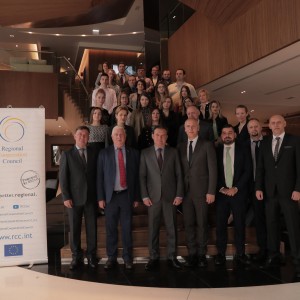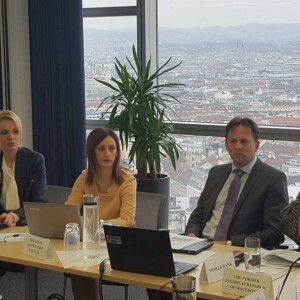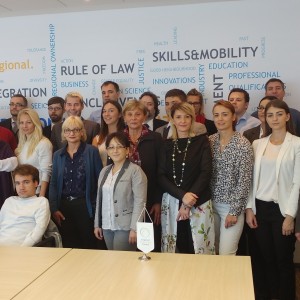Annual Meeting endorses new RCC strategy, annual report and nomination of Secretary General
22 June 2010

The second RCC Annual Meeting took place in Istanbul, Turkey, on 22 June 2010. (Photo RCC/Dinka Zivalj)
ISTANBUL/SARAJEVO – The Annual Meeting of the Regional Cooperation Council (RCC), held in Istanbul today, endorsed the organization’s 2011-2013 Strategy and Work Programme, and the Annual Report of its Secretary General for the past year’s activities.
The RCC members also endorsed the nomination proposal for the appointment of the Secretary General for a two-year period (2011-2012). At the same time, the International Organization for Migration (IOM) was admitted into membership, thus setting the total number of RCC members at 46 countries, organizations and international financial institutions.
The meeting, co-chaired by RCC Secretary General Hido Biscevic and Turkish Foreign Minister Ahmet Davutoglu as the current chair of the South-East European Cooperation Process (SEECP), discussed developments in regional cooperation in South East Europe within the RCC framework, as well as challenges ahead of the organization.
“Today, we talked about reaffirming dedication of our members from South East Europe, our partners and friends from Europe and the world, to genuine cooperation, dialogue, mutual understanding, accommodation, and good neighbourly relations”, said Hido Biscevic, RCC Secretary General.
“Important political decisions in this sense were taken at national levels, and the RCC contributed to creating a favourable spirit for cooperation throughout the region. The efforts have been directed at fostering economic and social progress, promotion of democratic values and reforms, contributing in that way to European and Euro-Atlantic aspirations of our members from South East Europe.”
The new Strategy and Work Programme of the organization was designed to serve as an impetus for a myriad of RCC activities over the next three years.
“It responds to the needs of the region, and aims to profile the added value of an enhanced cooperation in priority areas in South East Europe. It was prepared in close cooperation with the European Commission and other the RCC members”, added Biscevic.
Key RCC activities include: transfer of the South East European Investment Committee from the Organisation for Economic Co-operation and Development (OECD) to the RCC by the end of 2010; design of a feasibility study on development of air transport links in South East Europe; development of 2011-2014 regional strategy on justice and home affairs; realization of a Southeast and Central Europe Catastrophe Risk Insurance Facility and the establishment of a South East European Regional Fire-Fighting Centre Network; reshaping the Education Reform Initiative of South Eastern Europe; and the transfer of the Ljubljana Process on cultural heritage from the European Commission and the Council of Europe to the RCC by early 2011.
The RCC Annual Meeting is held back to back with the SEECP Summit. It is co-chaired by the Secretary General and the Foreign Minister of the SEECP Chairmanship-in-Office, and meets at the level of senior civil servants or above. The Annual Meeting ensures the strategic co-ordination and development of regional co-operation processes, reviews and endorses the organization’s strategy and the Secretary General’s Annual Report on regional co-operation.
The 2009-2010 Annual Report of the RCC Secretary General on regional cooperation in South East Europe is available HERE and the RCC Strategy and Work Programme for 2011-2013 is available HERE.
More information about this meeting, including the introductory speeches, agenda, programme and list of participants is available HERE.




